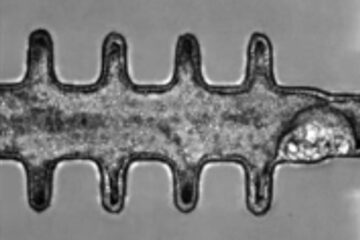Healthy eating is focus of cross-Channel communities project

The first phase of a two-year healthy schools and communities project between partners in Kent and Pas-de-Calais started in September 2005. The official Kent launch will take place in Dover on 27 January 2006.
Titled Bien-être, the British partners in this European Development Fund (ERDF) Interreg IIIa project are the Kent and Medway NHS Health and Europe Centre based at the European Institute of Social Services at the University of Kent; East Kent Coastal Teaching Primary Care Trust; Kent County Council Education and Libraries; and schools in the Dover Cluster.
Project research and outcome evaluation will be provided by the Centre for Health Services Studies at the University of Kent.
The objectives of Bien-être are to create cross-border and local learning networks – comprised of those who are involved with the health and education of children and the well-being of communities – in order to learn from different cultures; to foster mutual understanding of different methods of health and educational service delivery; and to explore opportunities for reducing health inequalities in schools and local communities.
By focusing on food, the project will stimulate interest in healthier lifestyles through professional, social and cultural exchanges and increased community involvement in local projects, will further community development, and improve the lives of children and parents in local areas.
The project will also increase access for all children, their families and the wider community to a range of cultural activities focused on the enjoyment of healthy eating.
As part of the project, there will be two one-day Festivals of Food, Culture and Sports – one in Pas-de-Calais and one in Kent – bringing together schoolchildren, members of the community, health professionals and head teachers and teachers involved in the Bien-être project, as well as other health and education professionals from the area.
Students from Astor College for the Arts in Dover will also keep a video diary of the project.
Gillian Vass, Manager of the Kent and Medway NHS Health and Europe Centre and the British Bien-être Project Lead Manager said, ‘As this project is community-based it brings together a host of partners from across a wide sector, all of whom contribute to the well-being of schoolchildren and communities. The strength of the cross-border partnership is evidenced by the fact that all partners have a wide range of experiences to share. For example, in Pas-de-Calais a local network for the delivery of healthy schools and community projects has already been established. Therefore, this network’s experiences will add great value to the project and will contribute greatly to the shared learning outputs.
‘Similarly,’ Gillian added, ‘partners in Kent have also launched several community and healthy eating initiatives, such as breakfast clubs, which are not always included in the French programme, thus further enriching the opportunities for shared learning and partnership working.’
It is anticipated that lasting networks will be established during the lifetime of Bien-être which will enable participants on both sides of the Channel to work together on health issues in the long term.
Media Contact
More Information:
http://www.kent.ac.uk/news/All latest news from the category: Health and Medicine
This subject area encompasses research and studies in the field of human medicine.
Among the wide-ranging list of topics covered here are anesthesiology, anatomy, surgery, human genetics, hygiene and environmental medicine, internal medicine, neurology, pharmacology, physiology, urology and dental medicine.
Newest articles

Solving the riddle of the sphingolipids in coronary artery disease
Weill Cornell Medicine investigators have uncovered a way to unleash in blood vessels the protective effects of a type of fat-related molecule known as a sphingolipid, suggesting a promising new…

Rocks with the oldest evidence yet of Earth’s magnetic field
The 3.7 billion-year-old rocks may extend the magnetic field’s age by 200 million years. Geologists at MIT and Oxford University have uncovered ancient rocks in Greenland that bear the oldest…

Mini-colons revolutionize colorectal cancer research
As our battle against cancer rages on, the quest for more sophisticated and realistic models to study tumor development has never been more critical. Until now, research has relied on…





















